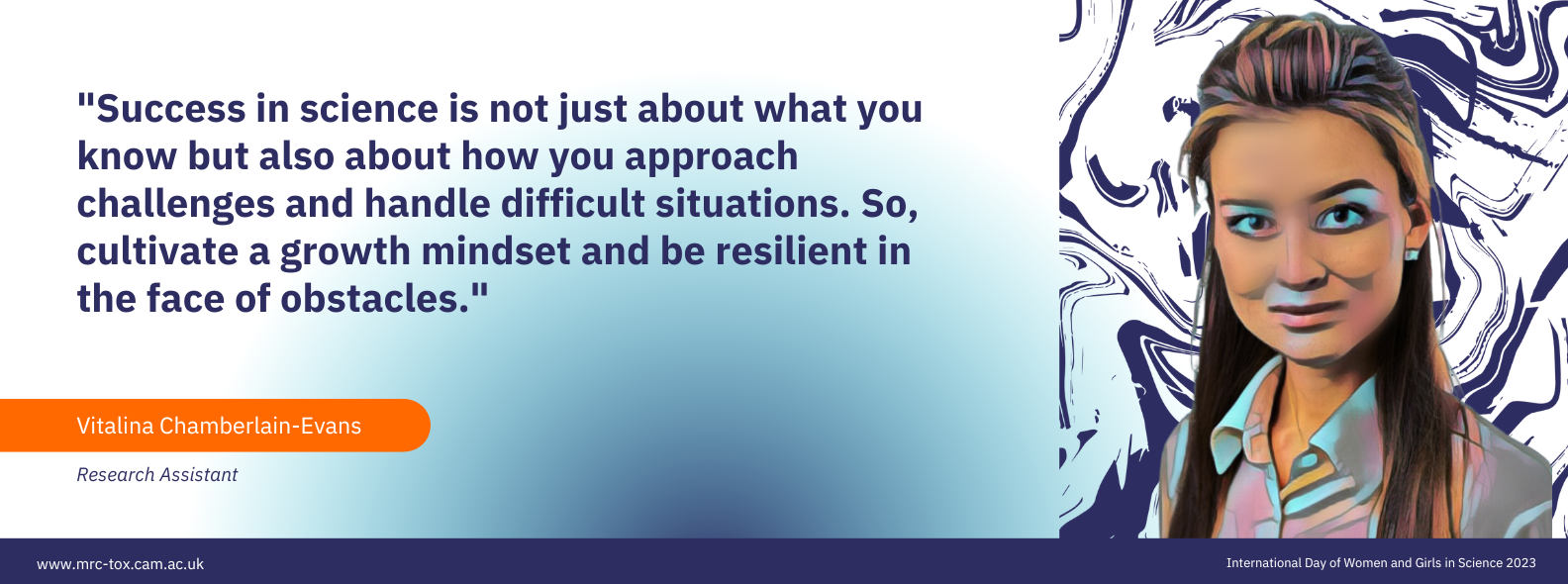To mark International Day of Women and Girls in Science 2023, we are sharing profiles of some of the women from the MRC Toxicology Unit highlighting their careers, experiences, passions and more. Today we want to introduce you to Vitalina.
Who are you, and what is your role?
Hello! I'm Vita Chamberlain-Evans. I work as Research Assistant in the Thaventhiran lab. My background is in molecular biology, and my speciality is in immunogenomics. This exciting field is all about using genomic technologies to gain a deeper understanding of immune responses. Currently, I focus on developing new methods for antibody gene sequencing for the latest single-cell sequencing techniques. The human body is capable of producing one hundred trillion unique antibodies, and it takes advanced genetic techniques to capture this incredible diversity and any changes that may occur.
In addition to my research, I also play a supporting role in the lab by carrying out single-cell sequencing experiments (such as those performed with 10x and Parse technologies) and other tasks that involve genetic or molecular biology experiments.
Were you always going to be a scientist?
I have always had a fascination with biology, fostered by my family members, who are all medical doctors. This interest was solidified when I was offered an internship in a lab during high school. There, I was introduced to the exciting world of developing new protocols for analysing adaptive immune receptor repertoires, including antibodies and T cell receptors, in order to study autoimmune and vaccine responses.
I was captivated by the beauty and elegance of method design and innovative genomic techniques and decided to pursue a degree in genetics, immunology, and bioinformatics. My thesis work also focused on this field. I have since then worked as a molecular biologist and bioinformatician on various projects. I have had the opportunity to work on a diverse range of topics, from identifying genes that influence behaviour in domesticated foxes to developing and applying methods for analysing innate immune receptors to study pregnancy disorders and viral infection responses.
Throughout my journey, I have discovered my true passion lies in utilising new approaches to analyse some of the most variable genes in our body, the antibody genes. I hope to continue to grow in this field and eventually pursue a PhD, leveraging the experience I have gained as a research assistant and by supporting others with their projects.
Do you consider yourself to be a role model?
I would not describe myself as a role model. Instead, I am deeply appreciative of the many individuals who have helped me get to where I am today through their advice, guidance, and training. They have also instilled in me a true passion for conducting research.
In my work as a molecular biologist, there can be challenging moments when methods don't seem to be working as planned. It can be difficult to determine whether it's a result of a mistake on my part or simply the nature of the field. During these times, the unwavering motivation and determination of my mentors and supervisors to continue trying new approaches has been invaluable in helping me stay positive and resilient. Their example has been a source of inspiration and has taught me the importance of perseverance in the face of setbacks.
What has been the proudest moment of your career so far?
It is challenging to select just one proud moment from my career. Instead, I try to find joy and pride in many different accomplishments, both big and small. These can range from assisting a colleague with troubleshooting an experiment to winning a scholarship or having a research paper accepted for publication in a peer-reviewed journal. These moments are what makes my work as a molecular biologist so rewarding, and I am grateful for each and every one of them.
What do you enjoy doing outside of work?
Outside work, I am passionate about volunteering and organising public outreach activities about immunology, genetics, and molecular biology. I find it incredibly fulfilling to find new and creative ways to explain complex biological concepts and engage with a diverse range of audiences, from kids to high school students and adults.
In my leisure time, I also enjoy yoga, going to the gym, skiing, playing golf and tennis. I have a love for cooking, gardening and spending time with my husband and our two dogs. These activities bring balance to my life and allow me to recharge and focus on my physical and emotional well-being.
What advice would you share with other women in science or girls interested in getting into science?
My advice for women in science or girls interested in pursuing a career in science is to follow your passion and find what makes you truly happy in your work. It is important to listen to your own instincts and pursue what interests you. Additionally, I recommend broadening your skill set and learning multiple techniques so you have a range of career options available to you. Be open to new opportunities and be flexible in your approach, as this will allow you to grow and evolve in your career. Remember that success in science is not just about what you know but also about how you approach challenges and handle difficult situations. So, cultivate a growth mindset and be resilient in the face of obstacles.





